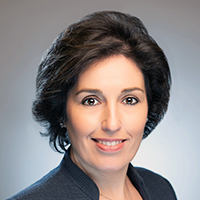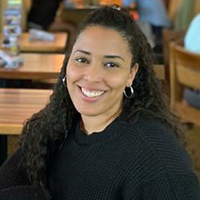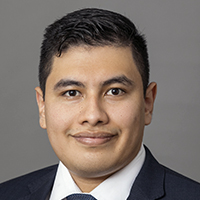Hispanic Heritage Month 2022: Spotlighting Hispanic Employee Career Journeys
Here at GMAC (Graduate Management Admission Council), we are proud to share our heritage and discuss how it has influenced our lives and careers.
To celebrate Hispanic Heritage Month, three of our Hispanic employees have shared their experience about how their rich culture has played an integral part in their personal business education career journeys.
Our guest speakers:
- Maite Salazar, GMAC Chief Marketing Officer
- Clarisa Figueroa Bautista, GMAC Marketing Manager, Americas Region
- David Ortega, GMAC Consultant and recent MBA graduate
 |
 |
 |
This interview has been edited and condensed.
How does your Hispanic background influence your approach to leadership?
Maite: Spanish influence tends to be quite effusive, energetic, colorful, and sometimes passionate. Also, the historical relations between Spain and Latin American countries have taught me about diversity, multicultural influences, and the importance of common grounds while respecting and valuing differences. Finally, the focus on relationships is a common mark of the Hispanic culture. From a leadership perspective, I try to use some of the strong features of my Spanish heritage when they can be more effective. For example, in motivational sessions, in team building activities, in storytelling, when sharing vision, I make use of that energy, that colorful approach to add emphasis and substance. Our multicultural heritage is a great example of tolerance and acceptance, which─ as a leader ─are great values to bring to the table to build upon what gets us together, putting aside differences. I have learned to embrace centuries of heritage and use it as a strength to navigate organizational and my own development.
Clarisa: As a Dominican raised in Puerto Rico, I have two cultures influencing my upbringing. There is a strong sense of independence that was taught and observed from my surroundings. In my culture, women are empowered to grow to be independent and trace their steps to leave a footprint wherever they stand for others to follow. My mother has been my role model. She managed to continuously grow in her line of business while raising three children with the help of my father. I carry my mother’s name and middle name and say it with pride. One of the things I have learned from my mother is how to lead by example and build relationships that will take you a long way in life.
My father Felipe Figueroa and my mother, Clarisa Bautista, born and raised in Santo Domingo, were the foundation of what me and my siblings have been able to accomplish today. As I grew up, my sister, Karol, also became my role model as I saw her grow into the leader she is today. Through her, I was able to understand that some traits of a good leader are:
-
Active listening
-
Effective communication
-
Compassion and Empathy
David: I think that my family influenced me as well! I believe that the values and the culture that family teaches define how you see and do things. And as is well known, Hispanic people are friendly, colorful, and kind. So, I always try to incorporate these characteristics when I lead a team or with my peers. I like getting to know people I work with to create an environment of confidence to make everyone feel comfortable in the team.
Maite and Clarisa, as Hispanic women in a senior position, what advice do you have to give to other female aspiring business leaders in the community?
Maite: I would recommend that they integrate their cultural assets into their leadership path. The rich background of the Hispanic community and the importance of relationships in our culture will make them very strong, understanding and people-first leaders. It is also important to practice self-awareness and reflect on the fact that people of other backgrounds and cultures might not be so familiar with the Hispanic way of doing things.
Clarisa: It is especially important to get to know yourself, identify your weaknesses and strengths to understand your areas of opportunity. Understand that your voice matters and no leader is alike. Once you determine the type of leader you are, it will be easier to become the leader your team needs. One quality I see among female business leaders is the confidence in what they must bring to the table. I believe this all comes with understanding your worth professionally and as an individual.
You have all been to business school or are planning to go, can you tell me about your personal journey?
Maite: When I was finishing my undergraduate degree in Spain, as many other undergraduates, I started to think about career opportunities. At the beginning, I thought of pursuing a more academic path, teaching and researching, but pretty soon I realized that I loved the business world and the impact that I could have to shape a better future, by helping companies to be more effective and conscious. Therefore, I pivoted towards business school and started with a master’s in marketing followed by a PhD at the Edinburgh University Business School. Looking back, I think that the combination of the academic rigor along with the strong emphasis on business related topics gave me a differentiating factor and exposure. I had a couple of job offers for global financial services companies even before completing my PhD. That is how I started in the corporate world. Almost 15 years later, I have worked in three different countries, I have experienced four different industries and I have managed to advance my career and leadership skills.
I continue investing in graduate and executive education, having completed programs in Harvard Business School, Northwestern Business School, and Columbia Business School. The reason I do that while working – in addition to being a wife and a mom – is because I truly believe that my graduate management education opened doors for me that would not have been available otherwise. That education has helped me reinvent myself and aspire to different or bigger roles, and more importantly, keeps giving me a competitive edge to take my career and professional goals to the next level.
Clarisa: I plan to start to prepare for this journey in about a year from now. The more I hear about the impact an MBA has had in candidates’ lives and the more I learn about our industry and business, I understand that pursuing an MBA will help me develop some skills I am yet to polish and learn new ones that will help me grow personally and professionally. As part of GMAC, I am also inspired by the women in Senior Leadership positions within the organization. I know an MBA will help me bring more to the table. On a more personal note, I want my daughter to see what her mom has been able to accomplish; I want to be a role model to my little ones just like my parents were to me.
David: I was born and raised in El Salvador, a little country in Central America. and sometimes coming from a small country adds new complications. For example, the journeys, the cost, the country that I should study in, among other tough decisions. I began my journey by looking at the rankings and looking for a program that fit with my interests of entrepreneurship, innovation, and networking with peers. I really wanted to build a network in Latin America to promote my own entrepreneurial journey especially given I have already started my own businesses in El Salvador and Colombia.
Two schools fit my needs, one in Costa Rica and the other in Mexico. I was accepted to both, and the deciding factor was the entrepreneurial content of the course at Mexico’s Tecnologico de Monterrey. Unfortunately, the pandemic made some aspects of the course a bit more challenging, like networking with my peers, but in the end, I was able to create long lasting connections with my classmates and secured the role at GMAC via the university connections I made. I can honestly say the MBA course has brought great value to my life and my career aspirations.
What Hispanic entrepreneurs do you most admire and why?
Maite: I particularly admire Amancio Ortega, the founder of Inditex, known for the Zara fashion retailer brand. He started working as a delivery boy for a men’s shirt maker in the north of Spain and quickly identified an opportunity in using affordable materials that – combined with more efficient manufacturing systems – will provide fashionable garments at competitive pricing. Today, Inditex is one of the largest fashion retailers with over 4,000 stores in 70 countries.
Clarisa: It is hard to select from so many members in our community that have developed their own business. I want to give each one of them their deserving flowers, especially my dad, an entrepreneur that I truly admire. He has consistently continued to push forward regardless of the obstacles that he may have found. He lives with my mother in Puerto Rico and even through Hurricanes like Maria and Fiona, he has managed to make his business thrive. I do admire his resilience, hard work, his innovation, and wisdom.
David: I really admire Alejandro Argumedo, CEO of Hugo, the most important delivery app in Central America and Caribbean. The application is the first unicorn from El Salvador – the first and the only one. I want to be the second one. I share his passion for delivering unforgettable products and experiences that make life better. This vision is what every entrepreneurial mindset should be. Alejandro is such a huge role model for me, and he also has an MBA.
What Hispanic educators do you most admire and why?
Maite: I have been fascinated by the School of Salamanca. This refers to an intellectual group of theologians who tried to explain and educate on the most critical concepts of theology but reconciling them with areas like logic, economics, law, society, and justice. They operated in the Sixteenth and Seventeenth centuries in Spain and Portugal. For me, it is interesting how they were facing the need to explain a new era and how human beings fit in those new times and challenged existing beliefs while pushing the boundaries of the theology and trying to build from it instead of against it.
Clarisa: Felicita Aponte, my second-grade teacher, whose passion for her instruction really came through in her teachings and left a mark in my development. Also, my brother, Dr. Roger Figueroa, works as the Assistant Professor of Social and Behavioral Science in Nutrition at Cornell University. His work is positively impacting the lives of many students and people in the community.
David: I am incredibly grateful to the educators that I have had in my life. Especially the group of professors that have changed my life during my MBA. My Finance professors who studied at Stanford gave incredible insights into entrepreneurial ecosystems. They changed my mind about the subject and the importance of finance and investment in business. They showed me to not be afraid to go for the investment that I need and made me more confident in pitching to investors. To them I say thank you so much!
How will you celebrate your culture this month?
Maite: I am part of a couple of associations of Spanish nationals living in the US, so we are organizing several activities to get together, celebrate our culture, our countries and – as it could not be otherwise – our food. There is a book that is going to be presented in that forum and multiple activities for the kids to learn and embrace their heritage.
In my current organization, the Graduate Management Admission Council, we have planned a team outgoing day and it is going to have a lot of Hispanic flavor. I cannot share too much about this since the meeting is just coming up and I do not want to give away the surprise!
Clarisa: We do celebrate this on a weekly basis by cooking all the delicious traditional foods, but during this time more than ever we find opportunities to:
-
Support Hispanic-own businesses
-
Attend different festivals that celebrate our culture
-
Trying new restaurants that cook our awesome food for my children to enjoy
-
Connecting with people from different cultures in Latin America.
David: In Latin America we always have something to share! Especially with food because food is so different across all the regions. I am part of a couple of associations of Latin Americans living in Mexico. We organize activities to get together and share food and culture. I am always proud to say that I am from El Salvador and am always talking about my country at every opportunity!
